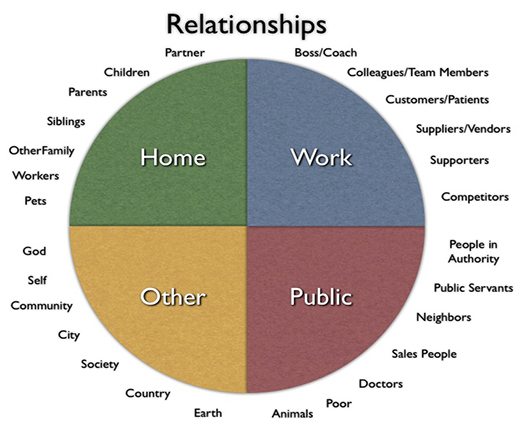Life
5 Easy Tips For Cultivating Relationships That Matter
Relationships are important, aren’t they? Everyone knows this. Having key relationships is important whether you are a professional rising within the ranks of your organization, or an entrepreneur who is working to grow their business.
Without cultivating lasting relationships, it becomes almost impossible to achieve the success you desire. It’s like trying to build a car all by yourself using nothing but a hammer and a prayer. It just won’t work.
The problem? Building relationships isn’t easy. It takes quite a bit of work to develop the connections you need to move forward. However, there are things you can do to cultivate the relationships you need in order to accomplish your goals.
Here are 5 tips to cultivate relationships:
1. Be a helper
Let’s face it, we’re all self interested, aren’t we? Sure, some are more self interested than others, but it’s a trait we all have nonetheless. The bottom line is that people tend to be focused on themselves and their needs.
So what does this mean for you? It means that the more valuable you are, the more relationships you will have. Not only that, the relationships you build will be deeper than most.
In order to become a person of influence, you have to become a person of value. When you find ways to benefit the people you interact with, they will trust you more than those who do not. This means they will be far more likely to help you when you need it.
The great thing about this is that the things you do don’t have to be deep and profound. Even the little things will count. Do you know someone that could help the person you’re talking to? Is there a piece of advice you can give them that will help them achieve something? What if they just need a word of encouragement? Pay attention and see what people need. Whenever you can, be the one to give it to them.

2. Show genuine interest
If you’re like most people, you’re familiar with the phrase “people don’t care how much you know until they know how much you care.” It’s very true. You’ll never be able to form deep relationships with people who don’t believe you care about them.
However, the issue isn’t just being interested in the other person. The issue is showing that you’re interested. One of the best ways to do this is to make sure your conversations are focused on the other person as much as possible. When you show genuine interest in the other person, they will see that you’re someone who actually cares about them.
All you need to do is encourage them to talk as much as possible. Here’s 3 steps you should take in your conversations: ask them a question. When they answer make a short comment about their response. Then, ask another question. Wash, rinse, repeat. You can do this for as long as the conversation continues. When you do this, you will see how much of a difference it makes in your conversations.
3. Keep your promises
Nobody likes people who make promises that they fail to deliver on. When you say you are going to do something, do it. However, this doesn’t mean you have to be perfect. There are going to be times when you’re legitimately unable to do something that you thought you would be able to do. It happens to everyone.
Maybe you expected that you would be able to do something, so you committed to it. Then circumstances beyond your control prevented you from doing it. If this happens, apologize quickly and explain the situation. Take responsibility. If you’re someone who usually does what they say, the other person will be more likely to forgive you.
“A promise made is a debt unpaid.” – Robert W. Service
4. Make people feel important
One of the main needs we have as people is the need to feel important. Everyone wants to feel a sense of significance. We need to know that the things we do actually matter. It’s one of the reasons people become resentful when we feel that people aren’t appreciating us.
That’s why you need to make people feel important as often as you can. It’s pretty easy, really. You can do this by expressing true gratitude when they do something for you. You can give them sincere compliments when you notice their positive attributes. These are some simple things you can start doing today.
5. Don’t be afraid of vulnerability
One of the biggest obstacles that some people have is that they appear to be perfect. You know exactly who I’m talking about. That guy at the networking event who doesn’t seem to have a single flaw. They are so far above us mere mortals that we find it hard to connect with them.
Even though you know these people are just as human as everyone else, but there’s absolutely no outward evidence of it. If you want to build great relationships, don’t be this person. If you want to avoid this, you need to be more vulnerable.
Being vulnerable means letting other people see some of your flaws and weaknesses. Of course, I’m not suggesting that you spill your guts about every single failure and mistake you have ever made. I’m just saying that it’s okay to show that you’re human. You can do this by poking a little fun at yourself. Self deprecating humor goes a long way if you don’t overdo it. Also, if the situation allows, you can tell stories about times when you made mistakes or failed. Again, if you don’t overdo it, you will become more relatable to others.
“We have to nurture our young women and understand the beauty and the strength of being a woman. It’s kind of a catch-22: Strength in women isn’t appreciated, and vulnerability in women isn’t appreciated. It’s like, ‘What the hell do you do?’ What you do is you don’t allow anyone to dictate who you are.” – Jada Pinkett Smith
Relationships are critical to your success. You need strong relationships that benefit both you and the people you’re interacting with. When you have these types of relationships, you can go as far in your career as you want. Do yourself a favor. Start putting these tips into action. You will see how huge of an impact it can have.
How do you cultivate your relationships? Please leave your thoughts in the comment section below!
Did You Know
How Skilled Migrants Are Building Successful Careers After Moving Countries
Behind every successful skilled migrant career is a mix of resilience, strategy, and navigating systems built for locals.

Moving to a new country for work is exciting, but it can also be unnerving. Skilled migrants leave behind familiar systems, networks, and support to pursue better job opportunities and a better future for their families. (more…)
Life
10 Research-Backed Steps to Create Real Change This New Year
This New Year could finally be the one where you break old patterns and create real, lasting change.

Every New Year, we make plans and set goals, but often repeat old patterns. (more…)
Life
9 Harsh Truths Every Young Man Must Face to Succeed in the Modern World
Before chasing success, every young man needs to face these 9 brutal realities shaping masculinity in the modern world.

Many young men today quietly battle depression, loneliness, and a sense of confusion about who they’re meant to be.
Some blame the lack of deep friendships or romantic relationships. Others feel lost in a digital world that often labels traditional masculinity as “toxic.”
But the truth is this: becoming a man in the modern age takes more than just surviving. It takes resilience, direction, and a willingness to grow even when no one’s watching.
Success doesn’t arrive by accident or luck. It’s built on discipline, sacrifice, and consistency.
Here are 9 harsh truths every young man should know if he wants to thrive, not just survive, in the digital age.
1. Never Use Your Illness as an Excuse
As Dr. Jordan B. Peterson often says, successful people don’t complain; they act.
Your illness, hardship, or struggle shouldn’t define your limits; it should define your motivation. Rest when you must, but always get back up and keep building your dreams. Motivation doesn’t appear magically. It comes after you take action.
Here are five key lessons I’ve learned from Dr. Peterson:
-
Learn to write clearly; clarity of thought makes you dangerous.
-
Read quality literature in your free time.
-
Nurture a strong relationship with your family.
-
Share your ideas publicly; your voice matters.
-
Become a “monster”, powerful, but disciplined enough to control it.
The best leaders and thinkers are grounded. They welcome criticism, adapt quickly, and keep moving forward no matter what.
2. You Can’t Please Everyone And That’s Okay
You don’t need a crowd of people to feel fulfilled. You need a few friends who genuinely accept you for who you are.
If your circle doesn’t bring out your best, it’s okay to walk away. Solitude can be a powerful teacher. It gives you space to understand what you truly want from life. Remember, successful men aren’t people-pleasers; they’re purpose-driven.
3. You Can Control the Process, Not the Outcome
Especially in creative work, writing, business, or content creation, you control effort, not results.
You might publish two articles a day, but you can’t dictate which one will go viral. Focus on mastery, not metrics. Many great writers toiled for years in obscurity before anyone noticed them. Rejection, criticism, and indifference are all part of the path.
The best creators focus on storytelling, not applause.
4. Rejection Is Never Personal
Rejection doesn’t mean you’re unworthy. It simply means your offer, idea, or timing didn’t align.
Every successful person has faced rejection repeatedly. What separates them is persistence and perspective. They see rejection as feedback, not failure. The faster you learn that truth, the faster you’ll grow.
5. Women Value Comfort and Security
Understanding women requires maturity and empathy.
Through books, lectures, and personal growth, I’ve learned that most women desire a man who is grounded, intelligent, confident, emotionally stable, and consistent. Some want humor, others intellect, but nearly all want to feel safe and supported.
Instead of chasing attention, work on self-improvement. Build competence and confidence, and the rest will follow naturally.
6. There’s No Such Thing as Failure, Only Lessons
A powerful lesson from Neuro-Linguistic Programming: failure only exists when you stop trying.
Every mistake brings data. Every setback builds wisdom. The most successful men aren’t fearless. They’ve simply learned to act despite fear.
Be proud of your scars. They’re proof you were brave enough to try.
7. Public Speaking Is an Art Form
Public speaking is one of the most valuable and underrated skills a man can master.
It’s not about perfection; it’s about connection. The best speakers tell stories, inspire confidence, and make people feel seen. They research deeply, speak honestly, and practice relentlessly.
If you can speak well, you can lead, sell, teach, and inspire. Start small, practice at work, in class, or even in front of a mirror, and watch your confidence skyrocket.
8. Teaching Is Leadership in Disguise
Great teachers are not just knowledgeable. They’re brave, compassionate, and disciplined.
Teaching forces you to articulate what you know, and in doing so, you master it at a deeper level. Whether you’re mentoring a peer, leading a team, or sharing insights online, teaching refines your purpose.
Lifelong learners become lifelong leaders.
9. Study Human Nature to Achieve Your Dreams
One of the toughest lessons to accept: most people are self-interested.
That’s not cynicism, it’s human nature. Understanding this helps you navigate relationships, business, and communication more effectively.
Everyone has a darker side, but successful people learn to channel theirs productively into discipline, creativity, and drive.
Psychology isn’t just theory; it’s a toolkit. Learn how people think, act, and decide, and you’ll know how to lead them, influence them, and even understand yourself better.
Final Thoughts
The digital age offers endless opportunities, but only to those who are willing to take responsibility, confront discomfort, and keep improving.
Becoming a man today means embracing the hard truths most avoid.
Because at the end of the day, success isn’t about luck. It’s about who you become when life tests you the most.
Change Your Mindset
The Four Types of Happiness: Which One Are You Living In?
Most people chase success only to find emptiness, this model reveals why true happiness lies somewhere else.

In a world driven by rapid technological growth and constant competition, many people unknowingly trade joy for achievement. (more…)
-

 News2 weeks ago
News2 weeks agoBrandon Willington Builds 7-Figure Business by Ignoring Almost Everything
-

 Health & Fitness3 weeks ago
Health & Fitness3 weeks agoWhat Minimalism Actually Means for Your Wellness Choices
-

 Did You Know3 weeks ago
Did You Know3 weeks agoWhy Most Online Courses Fail and How to Fix Them
-

 Business3 weeks ago
Business3 weeks agoIf Your Business Internet Keeps Letting You Down, Read This
-

 Business2 weeks ago
Business2 weeks agoEntrepreneur’s Guide to Pay Stubs: Why Freelancers and Small Business Owners Need a Smart Generator
-

 Business1 week ago
Business1 week agoThe Salary Shift Giving UK Employers An Unexpected Edge
-

 Business1 week ago
Business1 week agoThe Simple Security Stack Every Online Business Needs
-

 Scale Your Business1 week ago
Scale Your Business1 week ago5 Real Ways to Grow Your User Base Fast






























3 Comments